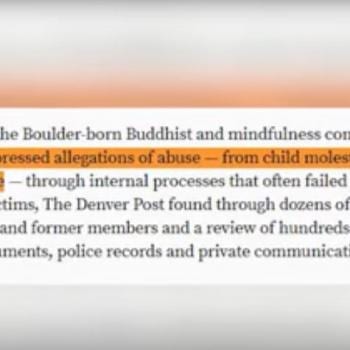This week’s amazingly close yet opposing posts by Jayarava and the Zennist reminded me of the amazing abundance and diversity of Western Buddhist’s views regarding science.
First (actually late last week), Jayarava wrote “On Credulity,” expressing a bit of amazement that educated people today still believe in the mystical qualities of crop circles, psychics, and chiropractors – all of which seem to have the same level of scientific veracity: zero. Jayarava writes that for instance:
In 1986 Randi exposed Peter Popoff as the same kind of fraud on Johnny Carsons’s Tonight show, but he is back with a vengeance fleecing the credulous and making tens of millions of dollars doing it.
The message seems to be that people want to believe. They want to believe in spirits, in immaterial beings and gods, in mysterious energies, in crystal vibrations, in psychic powers. People want to believe in magic.
But, he warns, this leads to all kinds of self-deception. It can even be fatal. On the other side of this magical thinking he promotes science, which I think he is quite right in arguing that while it is opposed to magical thinking, science is not opposed to meaning.
On the other hand, the Zennist writes in “My rant on the West:”
The ‘West’, if we think of it as representing the vanguard of science that brings us facts, not assumptions or fantasies, has brought us little in the way of real or reliable facts when it comes to certain important matters such as health. (I would like to get into cosmology but that is too long of a subject. Suffice it to say the Big Bang is bullshit.) Even today, we don’t really know the cause of cancer or heart disease or why males are far more likely to suffer from autism than females.
While the Zennist doesn’t mention Jayarava directly, one does get the feeling that he is responding to Jayarava’s post. Yet I also think that one can be sympathetic to the Zennist’s concerns about scientism (as opposed to science), without falling into magical thinking. So perhaps these two can be brought into some sort of agreement on things. That would require clearly delineating the epistemological edges of science and scientism, as the Zennist suggests:
Right now the West is the defender of the dogma of Scientism, that is, the omnipotence of the physical sciences, all of which rest completely on sensory consciousness and sensory experience. But even granting the West to be the upholder of reason, reason can know nothing purely of itself, according to Kant. The limit of seonsory experience cannot go beyond the conditioned, either.
I think Alan Wallace did a good job of unpacking the philosophical history of Scientism in “The Taboo of Subjectivity” several years back. In fact, I think very few people would defend clear-cut scientism (and I don’t think Jayarava hints at being one of those himself). In the philosophy of mind, the Hard Problem of qualia represent a sort of stopping point at our ability to claim omnipotence through science. Just as in so much Buddhist analysis of the mind and experience, this “problem” for Western would-be (or actual) materialists tells us that our every experience of the material world is in fact merely a compound of subjective mental states. Needless to say, many good arguments have been made to solve the Hard Problem, but none has gained widespread support as of yet.
I studied philosophy of mind in my undergrad in philosophy, looked into Buddhist philosophies of mind later for a religious studies conference, and then did more – focusing on Bohmian Quantum Mechanics, the theoretical side, not the mathematical – during my stint as a grad student in philosophy. My experience in all of that work can be summed up no better than (borrowing shamelessly from Jayarava), as Richard Feynman said:
“Science—knowledge—only adds to the excitement, the mystery, and the awe of a flower. It only adds. I don’t understand how it subtracts.” [Feynman. The Pleasure of Finding Things Out. BBC]
Well, one thing it might have subtracted was a youthful sense of knowing it all 🙂











